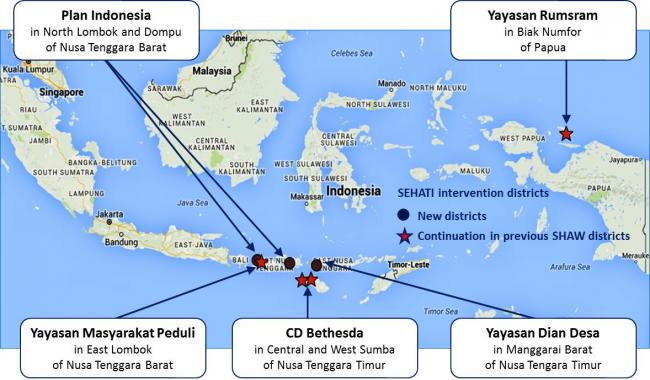Country: Indonesia | Client: Simavi | Duration: 2015-2019
Published on: 07/06/2016
SEHATI built on the success of the Sanitation, Hygiene and Water (SHAW) programme which actively promoted and pioneered the implementation of the Indonesian national strategy on Sanitasi Total Berbasis Masyarakat (STBM). STBM is the Indonesian concept of the Community-Led Total Sanitation. SHAW was implemented in nine districts in Eastern Indonesia from 2010-2015. During the implementation period a total of 802 villages were declared 100% STBM benefiting some 1.45 million people.
Similar to the SHAW programme, SEHATI was implemented in partnership with local district administrations, five Indonesian NGOs, one Dutch NGO and other relevant stakeholders in seven districts in East Indonesia: Rumsram in Biak Numfor, Yayasan Dian Desa in Manggarai Barat, Yayasan Masyarakat Peduli in Lombok Timur, CD-Bethesda in Sumba Tengah and Sumba Barat Daya, and Plan Indonesia in Lombok Utara and Dompu.
The SEHATI programme employed an adjusted model equipping the different stakeholders with the right approaches, tactics, tools and skills to enable them to achieve full coverage in their districts. The SEHATI partners initiated the start-up in each district, informed and built the capacity of local government actors, sanitation entrepreneurs and other local stakeholders, and then facilitated and supportedDurat implementation by these stakeholders.
The Dutch NGO Simavi coordinates the SEHATI programme and supports the central Indonesian Government on STBM policy and scaling up initiatives. SEHATI will be an important contribution to the Government of Indonesia’s vision of achieving universal access to sanitation by 2019. The programme will run from February 2015 till August 2019 and starts with a six-month inception phase. At the end of the 3.5 years programme, it is expected that the local government authorities of the seven districts will be able to independently implement, replicate, scale up and sustain the STBM five pillars in all the villages under their jurisdiction.

The dream of replicating and scaling up a new sanitation and hygiene delivery model throughout Indonesia. Read more...
On World Toilet Day, I am sharing a positive story to inspire everyone. Read more...
Implementing a highly successful rural sanitation and hygiene programme in East Indonesia has taught us some important lessons. The most relevant being that approaches designed and applied to implement a successful programme are not necessarily scalable. We learned that to be able to work at scale... Read more...
This book showcases an approach to expand the implementation coverage of the 5 pillars of Community-Based Total Sanitation. Read more...
The purpose of this report is to give an impression of the proceedings and discussions that took place during the first SEHATI Programme Coordinators... Read more...
This report provides a synthesis and summary of the Organisational Capacity Needs Assessment (OCNA) workshop held in Vientiane, Lao PDR, December... Read more...